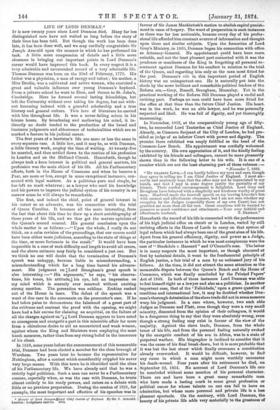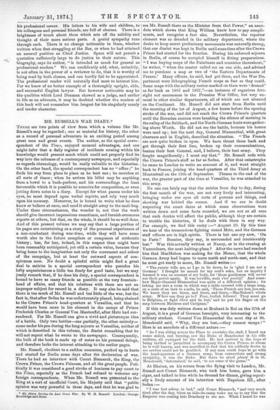LIFE OF LORD DENMAN.* IT is now twenty years since
Lord Denman died. Many far less distinguished men have not waited so long before the story of their lives has been told. But though the work has been done late, it has been done well, and we may cordially congratulate Sir Joseph Arnould upon the manner in which he has performed his task. A little more compression of details and a little more clearness in bringing out important points in Lord Denman's career would have improved this book. In every respect it is a very admirable and unvarnished record of a very admirable life. Thomas Denman was born on the 23rd of February, 1779. His father was a physician, a man of energy and talent ; his mother, a Miss Brodie, was a cultivated and active woman, who exercised a great and valuable influence over young Denman's boyhood. From a private school he went to Eton, and thence to St. John's, Cambridge. Here he formed several lasting friendships, but left the University without ever taking his degree, but not with- out becoming imbued with a graceful scholarship and a true literary and general culture. This love of literature he carried with him throughout life. It was a never-failing solace in his leisure hours. By broadening and mellowing his mind, it in- directly no doubt tended to the production of the broad and luminous judgments and abhorrence of technicalities which are so marked a feature in his judicial career.
The first years of a barrister's life are more or less the same in every separate case. A little law, and it may be, as with Denman, a little literary work, employ the time of waiting. At twenty-five he married, and then settled down to the routine of his profession in London and on the Midland Circuit. Henceforth, though he always took a keen interest in political and general matters, his profession was the main object of his life. All his Parliamentary efforts, both in the House of Commons and when he became a Peer, are more or less, except in some exceptional instances, con- nected with legal matters. As a politician pure and simple, he has left no mark whatever ; as a lawyer who used his knowledge and his powers to improve the judicial system of his country in no narrow sense he will always be remarkable.
The first, and indeed the chief, point of general interest in his career as an advocate, was his connection with the trial of Queen Caroline. It becomes all the more interesting, from the fact that about this time he drew up a short autobiography of these years of his life, and we thus get the mature opinions of the Queen's second counsel. His general conclusion upon the whole matter is as follows :—" Upon the whole, I really do not think, on a calm revision of the proceedings, that our course could have been either more judicious, according to the state of things at the time, or more fortunate in the result." It would have been impossible in a case of such difficulty and length to avoid all errors, and the above estimate may fairly be considered a just one. But we think no one will doubt that the termination of Denman's speech was unhappy, because liable to misunderstanding, a misunderstanding which for a long time barred his advance- ment. His judgment on ',Lord Brougham's great speech is also interesting :—" His arguments," he says, " his observa- tions, his tones, his attitude,] his eye, left an impression on my mind which is scarcely ever renewed without exciting strong emotion. The peroration was sublime. Erskine rushed out of the House in tears. The defect of the speech was a want of due care in the comments on the prosecutor's case. If he had taken pains to demonstrate the falsehood of a great part of the evidence and contrast the proof with the opening, we might have had a fair excuse for claiming an acquittal, on the failure of all the charges against us.",; Lord Denman appears to have acted so courageous and energetic a part in this miserable affair far more from a chivalrous desire to aid an unconvicted and weak woman, against whom the King and Ministers were employing the most harsh measures, rather than from any strong belief in the innocence of his client.
In 1818, some years before the commencement of this memorable trial, Denman had been elected a member for the close borough of Wareham. Two years later he became the representative for Nottingham, after a contest which considerably crippled his never very large means. With this town he is identified until the close of his Parliamentary life. We have already said that he was a strictly legal politician. Such a man can never be a Parliamentary success, especially when, as was the case with Denman, he trusts almost entirely to his ready powers, and enters on a debate with little or no previous preparation. During the session of 1821, for example, the most important and effective of his speeches was in
• Memoir of Lord Denman,ILord Chief Justice of England. By Sir J. Arnould. London: Longman and Co. 1874. favour of Sir James Mackintosh's motion to abolish capital punish- ment in cases of forgery. The want of preparation in such instances. as these was far less noticeable, because every day of his profes- sional life afforded him constant sources of information and thought upon these and similar subjects. Upon the formation of Lord Grey's Ministry, in 1830, Denman began his connection with office as Attorney-General. No appointment could have been more. suitable, and not the least pleasant part connected with it was the prudence or manliness of the King in forgetting all personal re- sentment against Denman for his conduct in relation to the trial- of the Queen, and regarding him only as the man most fitted for the post. Denman's role in this important period of English. history was no unimportant one. He is naturally put into the shade by the more brilliant and remarkable political leaders of the Reform era,—Grey, Russell, Brougham, Macaulay. Yet in the- practical working of the Reform Bill Denman played a useful and untiring part. Perhaps no man could have been more fitted for the office at that time than the future Chief Justice. His heart. was in the work, he was an able lawyer, and he was personally respected and liked. He was full of dignity, and yet thoroughly unassuming.
In November, 1832, at the comparatively young age of fifty- two, he succeeded Lord Teuterden as Chief Justice of England.. Already, as Common Serjeant of the City of London, he had pre-. aided as judge of an inferior Court with power and dignity. The. promise there exhibited was amply fulfilled as the head of the. Common-Law Bench. His appointment was cordially welcomed by the country. His own appreciation of it, and the kindly feeling exhibited by his friends and colleagues, cannot be more pleasantly shown than in the following letter to his wife. It is one of a. number which are not the least charming part of these volumes
:- "November 7, 1832. "Mr DEAREST LOVE,—I can hardly believe my eyes and ears, though they agree in telling me I am Chief Justice of England. I most sin- cerely and anxiously hopo that the office may not be depreciated in my: hands, and that I may in some degree justify the partiality of my friends. Their cordial encouragement is delightful. Lord Grey and Brougham have behaved with a simplicity and kindness worthy of great men. Shadwell made the farewell speech on my leaving Lincoln's Inn. with earnest and affectionate eloquence, but I am not sure whether my reception by the Judges (especially those of my own Court) has not gratified me more than all the rest. Great exertions will be wanted to- preserve so much confidence and attachment. —Your ever faithful and affectionate husband, T. DENMAN." Henceforth the record of his life is connected with the performance of his high judicial office on circuit or in London, varied by still untiring efforts in the House of Lords to carry on that system of legal reform which had always been one of the great aims of his life.. Apart from his general efficiency, dignity, and power as a Judge,. the particular instances in which he was most conspicuous were the case of " Stockdale v. Hansard " and O'Connell's case. The latter is in many respects the most important, as though obscured at first by technical details, it went to the fundamental principle of English justice, a fair trial of a man by an unbiassed jury of his fellows. At the time, it did not attract the same attention as the memorable dispute between the Queen's Bench and the House of Commons, which was finally concluded by the Printed Papers' Act of 1840. In both of these instances Lord Denman was able to feel himself right as a lawyer and also as a politician. In another important case, that of the Felicidade,' upon a grave question of maritime and international law, it may be doubted whether Den- man's thorough detestation of the slave trade did not in some measure warp his judgment. In a case where, however, two such able Judges as Denman and Platt, even though they were a very small minority, dissented from the opinion of their colleagues, it would be a dangerous thing to say that they were absolutely wrong, even. though a strong feeling may exist in favour of the view of the majority. Against the slave trade, Denman, from the whole tenor of his life, and from the personal feeling naturally evoked by the energetic conduct of his son in Africa, was in a state of perpetual warfare. His biographer is inclined to consider that it was the cause of his final break-down, but it is more probable that it was but the last straw which finally overcame a constitution
already overworked. It would be difficult, however, to find' any cause in which a man might more worthily encounter his death-wound. Four years after his retirement he died, on September 22, 1854. No account of Lord Denman's life can. be concluded without some mention of his personal character. There are and have been a great many remarkable men who have made a lasting mark in some great profession or political career for whose talents no one can fail to have an admiration, but whose more personal and private life is a less pleasant spectacle. On the contrary, with Lord Denman, the beauty of his private life adds very materially to the greatness of his professional career. His letters to his wife and children, to his colleagues and personal friends, are full of charms. There is a brightness of -touch about them which sets off the solidity and thought of their more serious parts. A genial sympathy runs through each. There is no change noticeable in them, whether written when first struggling at the Bar, or when he had attained an assured position as Chief Justice. Space will not permit a quotation sufficiently large to do justice to their nature. This biography, says its author, " is intended as much for general as professional readers." We can confidently add, what, unluckily, is not often in the power of a reviewer to do, that it is worthy of being read by both classes, and can hardly fail to be appreciated. The professional reader will naturally find most to interest him. For we know of no better example of a thoroughly upright, able, and successful English lawyer. But however noticeable may be the qualities which Lord Denman showed as a judge, and earlier in life as an advocate, it may be doubted whether the readers of this book will not remember him. longest for his singularly manly and tender character.



































 Previous page
Previous page